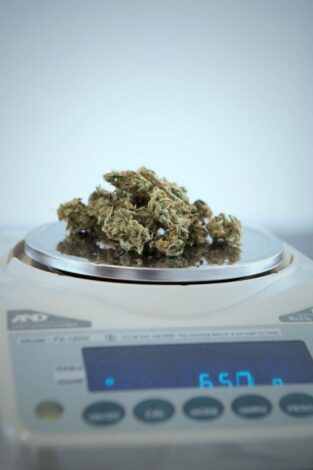Written by Steven K. Lubell, Esq.
California medical and adult-use cannabis regulations will require the use by Licensees of a Measuring Device Scale certified in accordance with regulations set by the California Department of Food and Agriculture – Division of Measurement Standards which provide that weighing or measuring devices used in connection with the sale or distribution of cannabis must meet standards equivalent to Division 5 of the Food and Agricultural Code (commencing with Section 12001).
All Scales must be of a type approved by the Division of Measurement Standards and issued either a California Type Evaluation Program (CTEP) Certificate of Approval (COA) or a National Type Evaluation Program (NTEP) “Certificate of Conformance” (CC) before commercial use. This process is known as “Type Evaluation.”
Type approved commercial scales are classified into groups and marked with an accuracy class (Class I, II, III, IIIL, or IIII). The nameplate on the scale will indicate the accuracy class. The “Verification Scale Interval” (also Verification Scale Division, e) is the smallest scale interval that can be used to determine price based on weight in commercial transactions for a particular scale. Consider the “e” value along with the accuracy class when considering a scale to determine that the scale meets California standards. The value of the verification scale interval (e) is determined by the scale manufacturer when submitting a device for type approval through a program such as NTEP.
The Division of Measurement Standards has recommended that cannabis dispensary scale should be of a Class II accuracy class with a weighing capacity of 1 kg, 2 lb. or 32 oz. or less, and readability (resolution) no greater than 0.05 grams, 0.002 oz. or 0.0001 lb. The Division of Measure Standards has recommended that a cannabis cultivator, producer or processor weighing larger amounts of cannabis, are required to use type-approved scales with a resolution of the scale at least 1/20th of the minimum amount of cannabis that will be weighed on the scale.
County Agricultural Commissioner Inspection & Calibration Certificate
The Scale prior to being placed into operation, and annually thereafter, must be registered and inspected by the County Agricultural Commissioner – Weights and Measures Inspector. The County Inspector will complete a calibration test of the Scale using standards that are traceable to an internationally defined standard in order to maintain uniformity. Once determined that the device is accurate, a Calibration Certificate will be issued indicating a successful calibration, and a seal will be affixed to the Scale indicating that the Scale has been tested for accuracy, with an expiration date setting forth the next date for inspection and calibration. Links to County Agriculture/Weights & Measures Departments is available at www.cdfa.ca.gov/exec/county/countymap/
For additional information see the Division of Measurement Standards publication “California Weights and Measures Regulatory Requirements for Medical Cannabis in the Areas of: Scale Selection; Scale Registration and Testing; Service Agencies; Packaging & Labeling Inspections; Weighmasters” available at: www.cdfa.ca.gov/dms/pdfs/MedicalCannabisRegulatoryRequirements.pdf
Disclaimer: This article has been prepared and published for informational purposes only and is not offered, nor should be construed, as legal advice.
Contact one of our California cannabis law firm specialists today by phone at 310-912-2960 or online.

